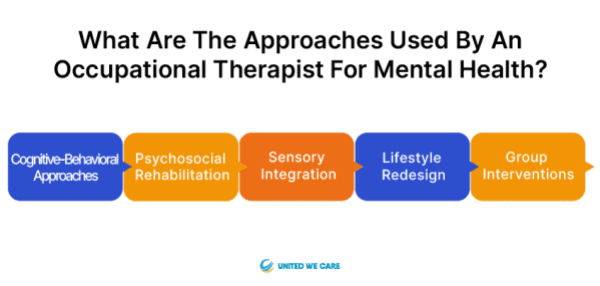Introduction
You might have come across people who cannot move or do any task themselves. Occupational therapists (OTs) help such people.
Occupational therapy (OT) is a healthcare line that helps to improve a person’s ability to perform daily activities. OTs give a new life to patients after accidents, mental health matters, and physical ailments when these events would have stopped them from completing even basic tasks. While performing their duties, OTs also go through many challenges that can lead to mental health concerns. They need to take a break and take care of themselves as well. Doing so will let them fulfill their duties to the best of their abilities.
“Occupational therapy is more than a job. For many, it is a calling. We felt drawn to it.” -Amy Lamb [1]
Who is an Occupational Therapist?
An occupational therapist (OTs) is a licensed healthcare professional who holds a valid degree to practice. Globally, around 500,000 individuals pursue their careers in the field. Accidents, physical ailments, and mental health concerns can restrict an individual’s ability to do his professional tasks, take care of himself, complete household duties, move around, or participate in activities.
OTs work with individuals of all ages to improve their well-being and help them perform their tasks on their own. They provide personalized treatment plans for their patients, using relevant therapeutic interventions like skills training.
What is the Role of an Occupational Therapist in Mental Health?
An occupational therapist aims to help individuals suffering from pain, paralysis, mental illnesses, and developmental disorders. Their role involves [3]:

- Assessment and Evaluation: Firstly, OTs will understand your goals and to what level you understand information and are physically able to work. They conduct detailed checks for the same. This assessment helps them figure out the impact of mental health and physical ailments on daily activities.
- Intervention Planning: Based on the assessment findings, OTs will design a plan of action with some fun activities to move toward your goals.
- Activity-Based Interventions: OTs make you participate in various activities, including crafts, leisure, and self-care routines. These activities can involve candle making, chocolate making, playing ball games, etc. These activities can help to enhance your mood and self-esteem and provide a sense of achievement.
- Environmental Modifications: OTs are required to help you change your physical environment. These changes can allow you to quicken your mental and physical health recovery. For example, they can ask family members to shift furniture in a particular manner or paint the house a certain color.
- Skills Training: For you to deal with your day-to-day activities, specific skills are vital. OTs teach skills like coping strategies, stress management techniques, etc. For example, learning to focus on your breath when you get stuck at some task.
- Collaboration and Advocacy: OTs work along with mental health professionals like psychologists, psychiatrists, social workers, and nurses so that the patient can get holistic help. They also visit schools, corporates, and community organizations to promote the field and their work.
What are the Approaches Used by an Occupational Therapist for Mental Health?
Occupational therapists apply various ways to take care of the patient’s mental health challenges and promote well-being. These approaches are unique to each patient, such as [4]:

- Cognitive-Behavioral Approaches: Cognitive-behavioral techniques help patients to identify and change negative thought processes, beliefs, and behaviors that add to mental health issues. OTs use this approach to help you cope better with the issues, learn to solve problems, and manage the emotions that arise.
- Psychosocial Rehabilitation: Nobody likes to depend on devices and people for performing basic activities. OTs help you develop basic functional skills in psychosocial rehabilitation. Once you are suitably skilled, you will be able to interact with people around you and do things you like.
- Sensory Integration: Sensory integration techniques like swinging, deep pressure, weighted vests, and brushing help patients remain calm, as the therapeutic journey can be painful.
- Lifestyle Redesign: Certain day-to-day activities may not support our journeys toward better mental and physical health. OTs help you rework or redesign your lifestyle.
- Group Interventions: Group therapies can make a person realize that they are not alone. OTs use such opportunities to provide social support, help develop the right skills, and increase feelings of self-worth.
What are the Challenges of an Occupational Therapist with Mental Health?
Dealing with patients from different age groups and problems is quite tricky. For occupational therapists, it can get difficult to remain objective and detached. These challenges can affect their mental health [5]:
- Stigma and Misunderstanding: Mental health field comes with stigma and misconceptions. OTs may face the same during their work. Patients might be reluctant to seek help, open up freely about their issues, question the therapeutic process, or have difficulty maintaining consistency and follow-through with therapy goals.
- Limited Resources: Mental health is all about helping people. However, at times it gets difficult to do so because of restricted funding, limited access to specialized training, and insufficient staffing. OTs may have to do everything on their own, which can put a lot of pressure on them and hamper the quality of their services.
- Complex and Varied Conditions: Mental health concerns can be varied and complex. Having knowledge about everything and being able to help all patients to the best of their abilities can be challenging and lead to stress.
- Workload and Burnout: Many patients need the help of occupational therapists in mental health. As the number of OTs is much lesser globally, each OT might have to take on multiple cases. More cases also means more documentation and a need for greater emotional bandwidth. OTs, therefore, might undergo stress, anxiety, burnout, and emotional breakdown.
More information about Workaholic
How can an Occupational Therapist Cope with their own Mental Health?
Like any healthcare professional, occupational therapists must prioritize their mental health and well-being to provide adequate care. Several strategies that OTs can employ to cope with their mental health [6]:

- Self-Care Practices: Self-care should be a part of your everyday life. Incorporate activities like socializing, working out, eating healthy, drinking enough water, and getting adequate sleep. If you take care of your physical health, your mental health will automatically get taken care of. Moreover, allow yourself to take leaves on days that are difficult for you.
- Supervision and Peer Support: Supervision and peer support provide you with reflection, guidance, and emotional support opportunities. These avenues enhance professional growth, validation, and a sense of community among OTs.
- Continuing Education and Professional Development: Mental health field is quite dynamic, as each individual has different needs. There is no “one size fits all” policy. Stay updated with the new trends in mental health and the OT field. This continuous learning can contribute to career growth and overall confidence.
- Boundaries and Time Management: Learn to manage your time well by creating personal and professional boundaries. Doing so can prevent you from taking on more than you can handle, thereby reducing stress and increasing productivity.
- Regular Self-Reflection: Reflecting on yourself can help OTs to identify and process their feelings, responses, and what causes stress. Writing in a journal, meditating, or getting therapy can help you to have a better understanding of yourself, manage stress, and improve self-awareness.
- Seeking Support: Professionals like OTs can also benefit greatly from self-therapy. Seeking support can provide you with a safe space to think and talk about personal concerns and develop effective coping strategies. United We Care is one such platform that can help you.
Read this article to get more information about Depression Therapist
Conclusion
Occupational therapists help individuals experiencing mental health concerns with their day-to-day activities. However, in doing so, they may ignore their mental well-being, which can hamper their efficiency at work and cause issues even in their personal lives. For that, they can seek therapy personally, indulge in self-care activities, talk to loved ones, and manage their time.
If you are an occupational therapist dealing with personal mental health concerns, connect with our expert counselors or explore more content at United We Care! At United We Care, a team of wellness and mental health experts will guide you with the best methods for your well-being.
References
[1] A. J. Lamb, “The Power of Authenticity,” American Occupational Therapy Association, Dec. 01, 2016. /ajot/article/70/6/7006130010p1/6215/The-Power-of-Authenticity
[2] “Occupational therapy in mental health | Grespi,” Grespi. https://www.grespi.com/articles/occupational-therapy-in-mental-health/
[3] G. Kielhofner and R. Barris, “Mental Health Occupational Therapy,” Occupational Therapy in Mental Health, vol. 4, no. 4, pp. 35–50, Nov. 1984, doi: 10.1300/j004v04n04_04.
[4] Y. L. Yasuda, “Occupational Therapy: Practice Skills for Physical Dysfunction (3rd ed.),” The American Journal of Occupational Therapy, vol. 45, no. 6, pp. 573–574, Jun. 1991, doi: 10.5014/ajot.45.6.573c.
[5] J. Culverhouse and P. F. Bibby, “Occupational Therapy and Care Coordination: The Challenges Faced by Occupational Therapists in Community Mental Health Settings,” British Journal of Occupational Therapy, vol. 71, no. 11, pp. 496–498, Nov. 2008, doi: 10.1177/030802260807101108.
[6] H. E. Brice, “Working with Adults with Enduring Mental Illness: Emotional Demands Experienced by Occupational Therapists and the Coping Strategies They Employ,” British Journal of Occupational Therapy, vol. 64, no. 4, pp. 175–183, Apr. 2001, doi: 10.1177/030802260106400404.





